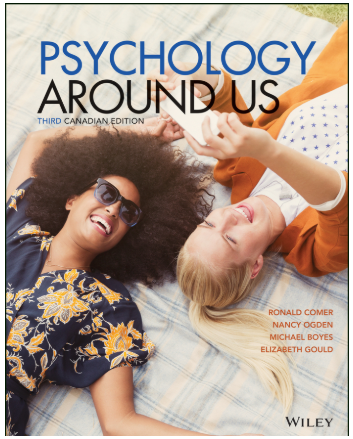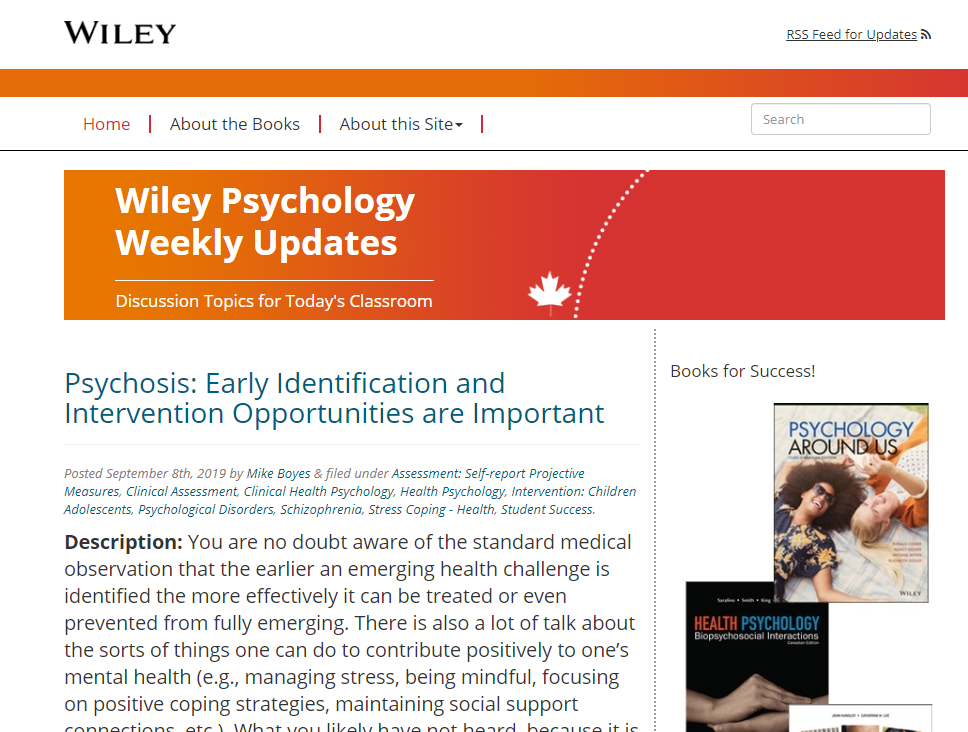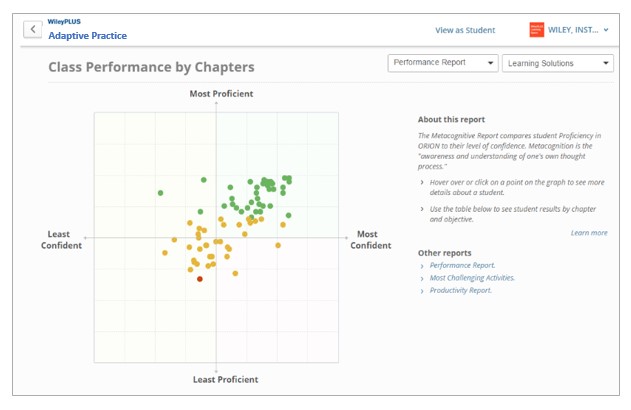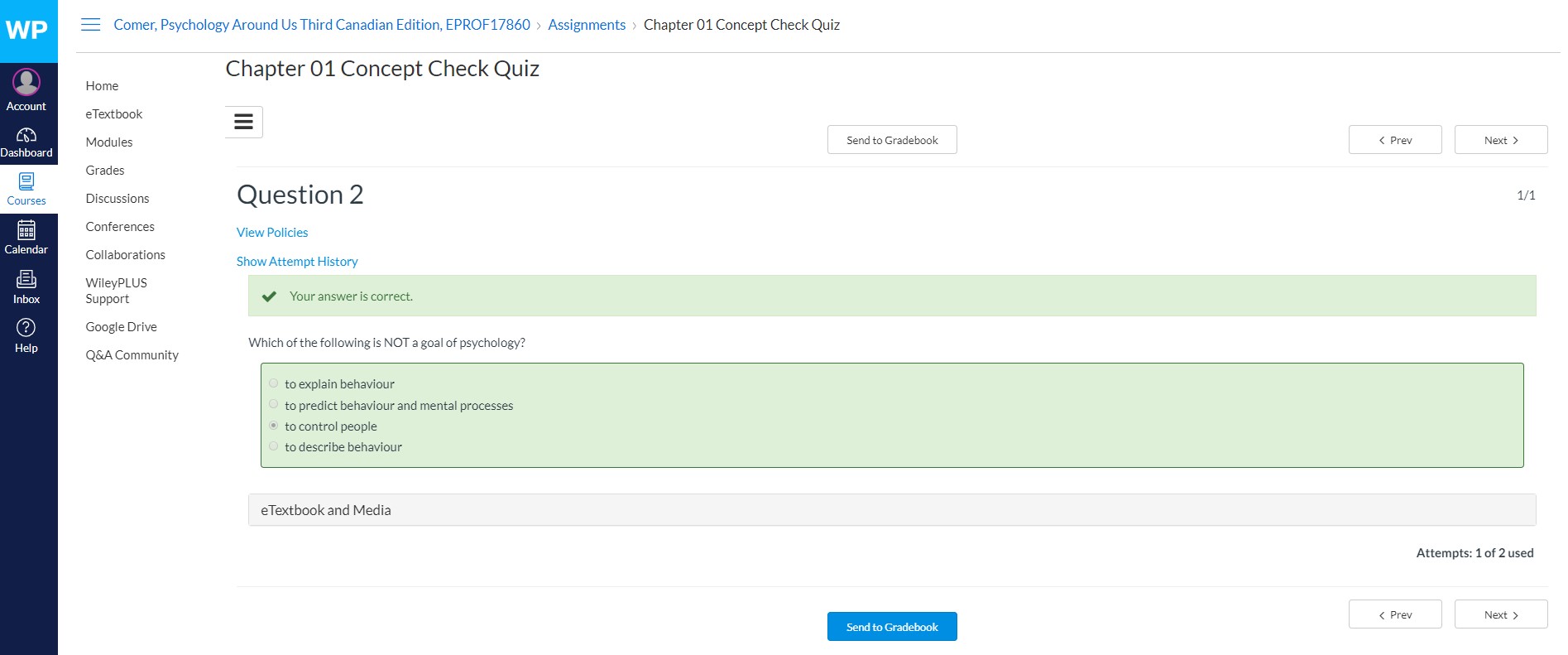
Psychology Around Us, 3rd Canadian Edition
By Ronald Comer, Nancy Ogden, Michael Boyes, and Elizabeth Gould
Psychology Around Us, Third Canadian Edition offers students a wealth of tools and content in a structured learning environment designed to draw students in and hold their interest in the subject. Psychology Around Us is now available with the new WileyPLUS which offers instructors the freedom and flexibility to tailor curated content, and easily customize their course with their own material. It offers today’s digital students with a wide array of media content — videos, interactive graphics, animations, adaptive practice — all integrated at the learning objective level, which provides students with a clear and engaging path through the material. Psychology Around Us is filled with interesting research and abundant opportunities to apply concepts in a real-life context. Students will become energized by the material as they realize that Psychology is “all around us”.
Schedule a Demo Sign Up for a Test Drive Adopt WileyPLUSWant to learn more about WileyPLUS? Click Here
Videos
Averaging about five minutes each in length, this collection of videos covers a range of relevant topics. Each video is a high-quality excerpt from various agencies or independent video libraries chosen from a televised news report, documentary, lab study, or the like, and illustrating a specific lecture point, bringing the topic to life in exciting ways.
Animations
New animations illustrate difficult-to-learn concepts from a real-world perspective and are included within the module where the topic is being discussed.
Interactive Graphics
This engaging tool allows students to interact with illustrations and diagrams that will help them actively explore and better understand complex concepts.

The Wiley Psychology Weekly Update
Available in WileyPLUS this valuable resource features articles and videos to help keep learners up to date on the field of psychology and illustrates the real-world significance of psychology in everyday life. Discussion questions are provided to help guide an understanding of the article or video and to encourage class participation.

Adaptive Practice
These pre-created applied quizzes allow instructors to quickly assign a short set of multiple-choice questions that test students’ ability to apply the material they have just learned.

Concept Check Quiz
These pre-created applied quizzes allow instructors to quickly assign a short set of multiple-choice questions that test students’ ability to apply the material they have just learned.
- Tying It Together: Chapters are structured with a cross-sectional presentation. Using this approach, every chapter on a substantive area of psychology includes wordmarks highlighting the integration of the four subfields of psychology—development, brain function, individual differences, and dysfunctions. These enable students to readily integrate the material into what they already know both from within the book and from their broader experiences.
- Your Brain and Behaviour: In recent years neuroscience has been tied to virtually every subfield of psychology. Accordingly, Psychology Around Us, Third Canadian Edition, incorporates neuroscience information into chapters where it has traditionally been absent, such as social psychology and consciousness.
- Chapter Opener Outline: Every chapter begins with an outline of the main headings in the chapter, with the accompanying learning objective. Each chapter also starts with a description about a person or situation to introduce concepts and interest students in the chapter content. This introductory material helps to give readers a big-picture overview of the chapter and helps to prepare them for the material they will need to learn.
- Guided Learning: A Learning Objective for each chapter section identifies the most important material for students to understand while reading that section.
- Following each section is a Before You Go On feature with questions that help students check their mastery of the important items covered. What Do You Know? questions prompt students to stop and review the key concepts just presented. What Do You Think? questions encourage students to think critically on key questions in the chapter.
- Special Topics on Psychology Around Us: Each chapter highlights interesting news stories, current controversies in and around psychology, and relevant research findings that demonstrate psychology around us. The Psychology Around Us boxes highlight how psychology affects us in our everyday lives, in every way, with examples from Canada and around the world. The Practically Speaking boxes emphasize the practical application of everyday psychology.
What’s New:
RONALD COMER has taught in Princeton University’s Department of Psychology for the past 35 years and has served as Director of Clinical Psychology Studies for most of that time. He has received the President’s Award for Distinguished Teaching at the university. Comer also is the author of the textbooks Abnormal Psychology, now in its seventh edition, and Fundamentals of Abnormal Psychology, now in its ninth edition, and is the coauthor of Case Studies in Abnormal Psychology. He is the producer of various educational videos, including The Introduction to Psychology Video Library Series. In addition, he has published journal articles in clinical psychology, personality, social psychology, and family medicine.
NANCY OGDEN is a professor at Mount Royal University in the Department of Psychology where she has taught for the past 25 years. She has previously published another Canadian introductory psychology textbook. Ogden has twice received the Teaching Excellence Award at Mount Royal University. She works and publishes in the areas of poverty, social and emotional development in children and adolescents and their families, homeless youth, physical literacy in early childhood, and in data management for non-profit agencies serving children, youth, and families. She also does research pertaining to the development of study strategy information in undergraduates.
MICHAEL BOYES has taught at the University of Calgary in the Department of Psychology for 30 years. He has previously published another Canadian introductory psychology textbook. Boyes received the University of Calgary Student Union Teaching Award. He publishes, consults, and runs courses and workshops in the areas of cognitive and social development in families, children, adolescents, and emerging adults, as well as in programs aimed at optimizing student experiences in post-secondary developmental pathways. He assists with the development and telling the stories (evaluation) of programs by and for urban Aboriginal children, youth, and families and programs dealing with domestic violence. He has also served as an expert witness in cases related to matters of adolescent consent.
ELIZABETH GOULD has taught in Princeton University’s Department of Psychology for the past 12 years. A leading researcher in the study of adult neurogenesis, she has published numerous journal articles on the production of new neurons in the adult mammalian brain. Gould has been honoured for her breakthrough work with a number of awards, including the 2006 NARSAD Distinguished Investigator Award and the 2009 Royal Society of the Arts Benjamin Franklin Medal. She serves on the editorial boards of The Journal of Neuroscience, Neurobiology of Learning and Memory, Biological Psychology, and Cell Stem Cell.
Chapter 1. Psychology: Yesterday and Today
Chapter 2. Psychology as a Science
Chapter 3. Neuroscience
Chapter 4. Human Development
Chapter 5. Sensation and Perception
Chapter 6. Consciousness
Chapter 7. Learning
Chapter 8. Memory
Chapter 9. Language and Thought
Chapter 10. Intelligence
Chapter 11. Motivation and Emotion
Chapter 12. Personality
Chapter 13. Social Psychology
Chapter 14. Stress, Coping, and Health
Chapter 15. Psychological Disorders
Chapter 16. Treatment of Psychological Disorders
Appendix A: Answers to Self-Study Questions
Appendix B: Statistics in Psychology

